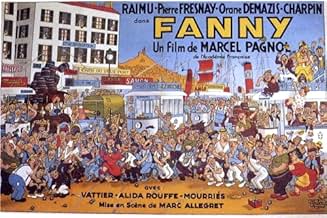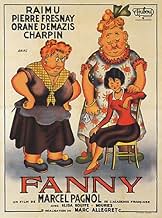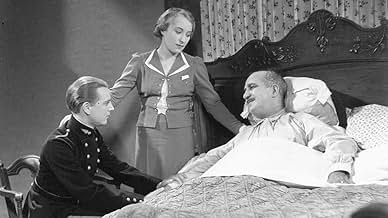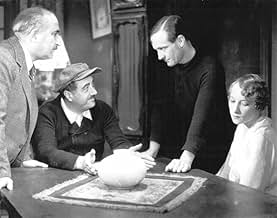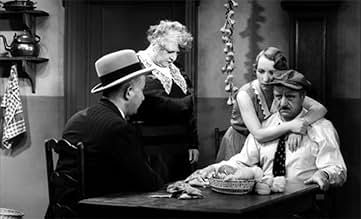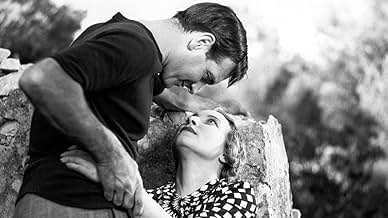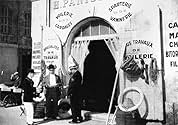IMDb-BEWERTUNG
7,8/10
2056
IHRE BEWERTUNG
Füge eine Handlung in deiner Sprache hinzuAfter Fanny's boyfriend leaves her and sails away, she finds out she's pregnant.After Fanny's boyfriend leaves her and sails away, she finds out she's pregnant.After Fanny's boyfriend leaves her and sails away, she finds out she's pregnant.
Fernand Charpin
- Honore Panisse
- (as Charpin)
Auguste Mouriès
- Félix Escartefigue
- (as Mouriès)
Robert Vattier
- Albert Brun
- (as Vattier)
Édouard Delmont
- Dr. Felicien Venelle
- (Nicht genannt)
Pierre Prévert
- Un voyageur du tramway
- (Nicht genannt)
Annie Toinon
- Amélie
- (Nicht genannt)
Empfohlene Bewertungen
Fanny (1932) :
Brief Review -
The best possible follow-up to Cult Classic 'Marius' and a highly sensitive content far ahead of its time. So this was exactly 37 years before Bollywood adopted this concept with "Ek Phool Do Mali" in 1969, which was considered ahead of its time due to the sensitivity of the topic then just imagine how far ahead Fanny was for its time? Truly unthinkable. And the maturity of this concept was beyond acceptance for 30s audience. French Cinema created a Classic Tear-jerker like 'Marius' (1931) but the way that film ends certainly gives a chance to a great follow-up which could have easily been predicted while watching Marius only. Fanny begins right where Marius ended as we see Fanny getting pregnant by Marius child after Marius had left to acquire his wild dreams. Panisse asks her to Marry him and promises to love the child like his own but things get messy as all of sudden Marius returns to visit the town for a short time of period. Okay, this was highly predictable and even the next things coming were pretty easy to predict or rather i would say things go exactly as you would have liked it to predict and therefore Fanny ends on an matured and fulfilling note. The problem here is, Fanny follows a Cult film which puts a lot of burden on it so obviously it stays behind its predecessor. The emotional quotient is not high when there was a potential for it and most importantly it doesn't make the characters look intellectual which it should have done considering their intellectual behaviour in the predecessor. However, for any Normal film it is overwhelming for sure. I dare everyone, beat the time limit of this content if you can. It was at least 2-3 decades ahead of its time for the impact in real life. Overall, its a deserving sequel which deserves individual love instead of underwhelming praise caused by comparison with its prequel.
RATING - 7.5/10*
By - #samthebestest
The best possible follow-up to Cult Classic 'Marius' and a highly sensitive content far ahead of its time. So this was exactly 37 years before Bollywood adopted this concept with "Ek Phool Do Mali" in 1969, which was considered ahead of its time due to the sensitivity of the topic then just imagine how far ahead Fanny was for its time? Truly unthinkable. And the maturity of this concept was beyond acceptance for 30s audience. French Cinema created a Classic Tear-jerker like 'Marius' (1931) but the way that film ends certainly gives a chance to a great follow-up which could have easily been predicted while watching Marius only. Fanny begins right where Marius ended as we see Fanny getting pregnant by Marius child after Marius had left to acquire his wild dreams. Panisse asks her to Marry him and promises to love the child like his own but things get messy as all of sudden Marius returns to visit the town for a short time of period. Okay, this was highly predictable and even the next things coming were pretty easy to predict or rather i would say things go exactly as you would have liked it to predict and therefore Fanny ends on an matured and fulfilling note. The problem here is, Fanny follows a Cult film which puts a lot of burden on it so obviously it stays behind its predecessor. The emotional quotient is not high when there was a potential for it and most importantly it doesn't make the characters look intellectual which it should have done considering their intellectual behaviour in the predecessor. However, for any Normal film it is overwhelming for sure. I dare everyone, beat the time limit of this content if you can. It was at least 2-3 decades ahead of its time for the impact in real life. Overall, its a deserving sequel which deserves individual love instead of underwhelming praise caused by comparison with its prequel.
RATING - 7.5/10*
By - #samthebestest
The sequel to "Marius" the year before stays in the same vein and is the same kind of staged theatre all the way, with the same kind of virtuoso performances by all the actors, but there is another director, and you miss the Alexander Korda flamboyance and liberal sweeps and flow of the movie tempo. This film is more like chamber theatre all the way, and you don't even see much of the harbour, the glorious ships, the street life and the joints. Fanny, left alone and pregnant by Marius going to sea for five years, marries another older suitor, just to give her child a future and safe environment, and it works out well, until Marius comes back after only two years as a most unsuspected surprise and does his best to complicate things but immediately leaves again. The story isn't much, it is very inferior to the first part, but there is a third part four years later, which will show the end of the story, directed by Marcel Pagnol, the author, himself - he made many films besides being a prolific Provence writer.
Part two of Marcel Pagnol's wonderfully simple, but, mind me, not simple-minded Marseilles trilogy is even funnier and more touching than its predecessor, thanks to expanded supporting roles and a broader variety of outdoor locations.
The dialogue is as humorously and emotionally rich as ever and the cast, almost outshone by Raimu's terrific performance, works wonders with their lines.
The pace may drag slightly from time to time and some story aspects feel redundant, but the basic concerns of Pagnol's deeply philanthropic approach to issues like paternal love, social constraints and diverging attitudes towards life offer more than enough pleasures.
8 out of 10 suspicious premature births
The dialogue is as humorously and emotionally rich as ever and the cast, almost outshone by Raimu's terrific performance, works wonders with their lines.
The pace may drag slightly from time to time and some story aspects feel redundant, but the basic concerns of Pagnol's deeply philanthropic approach to issues like paternal love, social constraints and diverging attitudes towards life offer more than enough pleasures.
8 out of 10 suspicious premature births
This is the second of the three part "Fanny Trilogy" by the French writer, Marcel Pagnol. Originally, they were a stage play, then a movie and then many years later in 1961, the three movies were combined to make one movie named FANNY. I've always loved the 1961 movie, so I was thrilled to see the original three movies--all part of a 4 disk set by Kino Video.
Throughout much of the 1932 movie, the lines were identical or very close to the 1961 film. Of the three movies, I think this one is closest to the 1961 film except that this one is in French with subtitles and is black and white. The 1961 version is simply a lot prettier--with great music, lighting, and acting. The earlier version, though wonderful, is a little more flat. Not bad--in fact, very good,...just kind of flat in comparison. If you only have the patience, see the 1961 combined film. If you are a cinephile, then see all of the films--the writing by Pagnol is amazing.
Throughout much of the 1932 movie, the lines were identical or very close to the 1961 film. Of the three movies, I think this one is closest to the 1961 film except that this one is in French with subtitles and is black and white. The 1961 version is simply a lot prettier--with great music, lighting, and acting. The earlier version, though wonderful, is a little more flat. Not bad--in fact, very good,...just kind of flat in comparison. If you only have the patience, see the 1961 combined film. If you are a cinephile, then see all of the films--the writing by Pagnol is amazing.
French playwright Marcel Pagnol, hooked on cinema since 1929, knew a sequel to one of his most famous plays which was turned into a movie would be a winner. When Paramount Pictures refused to produce a follow-up to 'Marius,' Pagnol formed his own film production company, and with the assistance of director Marc Allegret, released October 1932 "Fanny" to great acclaim.
Pagnol had seen his 1929 play 'Marius,' adapted into a 1931 film of the same name, directed by Alexander Korda. The story centered around a son of a Marseilles, France, bar-owner, Marius, who yearns to see the world by getting a job for a long sea voyage even though he had a serious relationship with his girlfriend Fanny. "Marius" was a success for Paramount. After the studio turned down Pagnol's offer for a sequel, the playwright proceeded to write a script penned as "Fanny" and make a movie from it. The difference in quality between the two films reflects the evolution of film technology that progressed quickly during that short period. Whereas the original was a stage-bound affair with most of its scenes constricted inside the tavern, 1932's "Fanny's" camera is more mobile, capturing exterior footage of Marseilles and tracking Fanny (Orane Demazis) throughout the city. Director Allegret hid his camera inside a van to capture the city's residents going about their business unaware they were on film. Because of such shots, producer Pagnol has been called a pioneer in cinema Neorealism, mixing both the dramatic plot of the movie with real-life scenes.
In "Fanny," the last night the two lovers spend together before Marius sets out on his five-year voyage results in a pregnancy. Upon discovering the budding life in her womb, Fanny turns to Honore Panisse (Charpin), a prosperous sea merchant who's 30 years older. In 'Marius,' he had proposed to Fanny, only to be rejected. In the sequel, Fanny is resigned to accept his proposal to marry for the sake of her newborn. Then, after two years at sea, Marius, on shore leave, surprises Fanny. That's when Pagnol makes things very interesting for all those involved. Film critic Jamie Rich said "the acting is so good, you might find yourself wishing this were an ongoing series."
Riding on the success of "Fanny," Pagnol wrote a sequel to the sequel. He gave up composing stage plays to make feature films, and he directed the third of his so-called 'Marseilles Trilogy,' 1936's 'Cesar.' The movie picks up the story of Fanny where her son, Cesariot, is a young man and is told about who his real father is after his adopted father Panisse died.
"Fanny's" international popularity gave French cinema a boast in both quality and popularity. Pagnol's trilogy has been made into several motion pictures, the first a James Whale directed and Preston Sturges scripted, 1938s "Port of Seven Seas." The three stories were combined into a 1954 Broadway musical, running an astounding 888 performances. The 1961 Technicolor film, "Fanny," with Leslie Caron, Maurice Chevalier and Charles Boyer, blends all three scripts of Pagnol's into one full-length film. And the Daniel Auteuil directed, written and acted 2013 "Fanny" was based on the 1932 version.
Pagnol had seen his 1929 play 'Marius,' adapted into a 1931 film of the same name, directed by Alexander Korda. The story centered around a son of a Marseilles, France, bar-owner, Marius, who yearns to see the world by getting a job for a long sea voyage even though he had a serious relationship with his girlfriend Fanny. "Marius" was a success for Paramount. After the studio turned down Pagnol's offer for a sequel, the playwright proceeded to write a script penned as "Fanny" and make a movie from it. The difference in quality between the two films reflects the evolution of film technology that progressed quickly during that short period. Whereas the original was a stage-bound affair with most of its scenes constricted inside the tavern, 1932's "Fanny's" camera is more mobile, capturing exterior footage of Marseilles and tracking Fanny (Orane Demazis) throughout the city. Director Allegret hid his camera inside a van to capture the city's residents going about their business unaware they were on film. Because of such shots, producer Pagnol has been called a pioneer in cinema Neorealism, mixing both the dramatic plot of the movie with real-life scenes.
In "Fanny," the last night the two lovers spend together before Marius sets out on his five-year voyage results in a pregnancy. Upon discovering the budding life in her womb, Fanny turns to Honore Panisse (Charpin), a prosperous sea merchant who's 30 years older. In 'Marius,' he had proposed to Fanny, only to be rejected. In the sequel, Fanny is resigned to accept his proposal to marry for the sake of her newborn. Then, after two years at sea, Marius, on shore leave, surprises Fanny. That's when Pagnol makes things very interesting for all those involved. Film critic Jamie Rich said "the acting is so good, you might find yourself wishing this were an ongoing series."
Riding on the success of "Fanny," Pagnol wrote a sequel to the sequel. He gave up composing stage plays to make feature films, and he directed the third of his so-called 'Marseilles Trilogy,' 1936's 'Cesar.' The movie picks up the story of Fanny where her son, Cesariot, is a young man and is told about who his real father is after his adopted father Panisse died.
"Fanny's" international popularity gave French cinema a boast in both quality and popularity. Pagnol's trilogy has been made into several motion pictures, the first a James Whale directed and Preston Sturges scripted, 1938s "Port of Seven Seas." The three stories were combined into a 1954 Broadway musical, running an astounding 888 performances. The 1961 Technicolor film, "Fanny," with Leslie Caron, Maurice Chevalier and Charles Boyer, blends all three scripts of Pagnol's into one full-length film. And the Daniel Auteuil directed, written and acted 2013 "Fanny" was based on the 1932 version.
Wusstest du schon
- WissenswertesFamed restaurateur and founder of California cuisine, Alice Waters, was so taken with the Fanny trilogy that she named her Berkeley restaurant Chez Panisse. The café upstairs from the restaurant is decorated with posters from the films Marius, Fanny, and César. Waters also named her own daughter Fanny and opened a small breakfast café in Berkeley called "Café Fanny" in 1984 which closed in March 2012.
- VerbindungenEdited into Geschichte(n) des Kinos: Une histoire seule (1989)
Top-Auswahl
Melde dich zum Bewerten an und greife auf die Watchlist für personalisierte Empfehlungen zu.
- How long is Fanny?Powered by Alexa
Details
Box Office
- Bruttoertrag in den USA und Kanada
- 8.262 $
- Eröffnungswochenende in den USA und in Kanada
- 7.720 $
- 8. Jan. 2017
- Weltweiter Bruttoertrag
- 8.262 $
- Laufzeit
- 2 Std. 20 Min.(140 min)
- Farbe
- Seitenverhältnis
- 1.20 : 1
Zu dieser Seite beitragen
Bearbeitung vorschlagen oder fehlenden Inhalt hinzufügen

